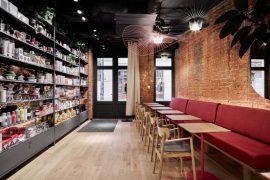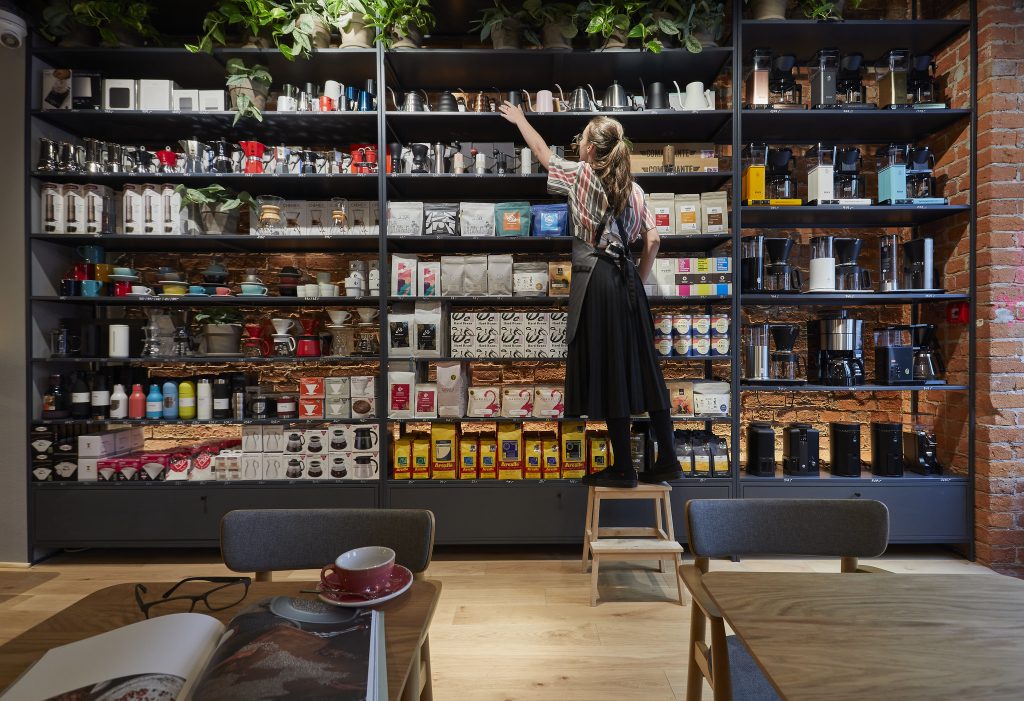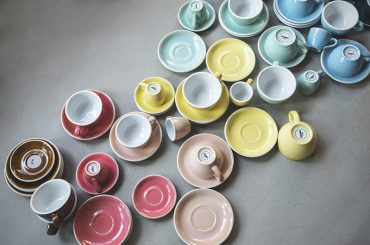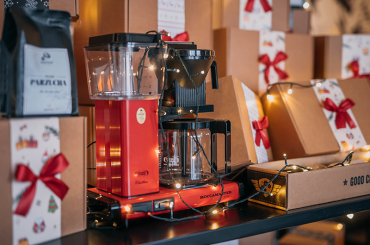The second crowdinvesting campaign in Coffeedesk’s history has been launched. The summary of the first campaign, our plans and forecasts are described in detail on the dedicated website. In a nutshell: our main investment goal is the development of omnichannel. This article describes what it is and explains why we believe that this business model is not only the future of Coffeedesk, but of the whole trade sector.
What Is Omnichannel?
Omnichannel carrying out selling and communication simultaneously via multiple channels, such as brick and mortar stores, online shops, mobile apps, all supported by social media and customer service. The premise for omnichannel is providing the customer with a consistent shopping experience regardless of the channel via which they interact with the brand. The companies that skilfully combine physical and digital realities achieve better outcomes and also, thanks to diversified revenues, perform better during lockdown.
Coffeedesk Omnichannel
As Coffeedesk we fill the cups of our customers with coffee through our online store, wholesale online store for business clients and a developing chain of boutique cafés – currently there are three cafés, we are raising funds for another two showrooms during our current crowdinvesting campaign. Multiple channels and diversification provide us with stable and high dynamics of growth (40% y/y, CAGR
69.6%) and we slowed down neither in 2020 nor in H1 2021, the periods strongly marked by the global pandemic and the related lockdown.
Why Do We Believe in Omnichannel?
More and more Poles shop online (about 73% of Internet users, according to the ‘E-commerce in Poland 2020. Gemius for e-Commerce Poland’ report). The vast majority of them buy the same brands through many channels (68% of the surveyed in the report by the Chamber of Digital Economy: ‘Omni-commerce. Buying conveniently’). The customers want to be in charge of how, when and where they do their shopping, and the possibility of smooth changes among many channels increases the brand attractiveness in the eyes of consumers. 73% of the Poles want retailers to continue sales via many channels, irrespective of the lockdown (Adyen Retail Report).
The customer jumps across multiple channels, always wants to have access to the same products, expects the data and information about his once set preferences to be available throughout the whole system and expects supreme level of service in every point of their contact with the brand.
‘Omnichannel helps to stabilize sales’, Łukasz Wichłacz, CEO of Coffeedesk said. ‘Diverse offer tailored to individual and business customers makes us flexible and resistant to market fluctuations. 2020 showed clearly that it is a good strategy – we compensated for closing down HoReCa sector during lockdown with the sales of other e-commerce entities, and in B2C channel we reached many new customers who, cut off from their offices and favourite cafés, started their coffee brewing adventure in their homes. Lockdown also confirmed our belief in the efficiency of the hybrid model of our showrooms – the combination of a café and a shop. Despite the lockdown of HoReCa sector for the better part of 2020, the outcomes of our showrooms were higher than in 2019’.
Synergy
We are using the synergy from all our business areas combined. B2B provides the brand with knowledge on the product and the industry and diversification of sales. B2C allows us to promote the products on the market and increase brand recognition. Proximity to the customer through social media and well-developed Customer Service, which are an integral part of B2C channel, allow to build long-term relations and study the shopping needs of the consumers.
Offline showrooms are a way of reaching people who still don’t shop online – according to Gemius Report it is 27% of the Poles. The most common reason for offline shopping is the need of physical contact with the product before purchase. ‘More showrooms means reaching clients who still prefer offline shopping’, says Sebastian Łęski – Head of Retail in Coffeedesk. ‘With opening new cafés we create other pick-up points for our online store, thus increasing our credibility and gaining new clients both in showrooms and in our online store. Our
plan is to open cafés in all bigger cities in Poland, which will lead to opening new warehouses and, in future, delivering orders on the day of purchase’.

Coffeedesk showrooms are meeting places and places of building rapport with current and potential customers. They can taste coffees offered by the brand, touch the products and see them at work. The most recent café – established after crowdfunding in 2020 at Próżna street in Warsaw – also holds a training room. Coffeedesk specialists, including many Polish Champions in barista competitions, can share their knowledge while training B2B and B2C clients, which builds the brand position as an expert and at the same time supports sales in these channels. Showrooms are also pick-up points for the parcels ordered via the online store. In the first weeks of the café’s operation it is a perfect way to quickly build a customer base. Finally, showrooms serve as the return and claim points, where the customer can leave the product in the hands of the brand that takes comprehensive care of the entire process.
‘About 8% of online shop orders are delivered to the café’, explains
Przemysław Słowik, Head of Customer Service.‘Right after opening a new café, we promote it as a pick-up point with extra discounts or free coffee at the delivery. Our own pick-up point is an extra encouragement for the clients and a real support for the newly opened spot – it can attract several extra clients per week’.
Coffeedesk showrooms have so far been established in Kotobrzeg – a seaside town which is the home to the brand – and in Warsaw, with two operating cafés at this moment. Two more cafés are planned to open by the end of 2022 – in the Polish capital and in Wrocław. Decisions concerning the location of our next cafés are based on the data from the online store – they are opened in the areas with our biggest customer bases.
The products displayed on the showrooms’ shelves are also based on the data from eCommerce, which regularly studies the sales of brands and SKUs. ‘We take advantage of the eCommerce scale effect’, adds Katarzyna Czajko, Operation Manager of the Cafés. ‘It is a broad test of the customer’s needs. Omnichannel in the cafés allows us to analyse the needs of our guests based on a much bigger customer base than in the case of our competitors. Special offers in the cafés are based on the data from the online store – we know when the clients are beginning to look for seasonal products and which colour of accessories they choose most often. We are also informed about the products that are currently promoted in eCommerce and we support this sale – often all you need to do is put a specific brand on display in order to make it more visible to the customers. We use data regarding the customer’s preferences, recurrence rate, location in a given city and burrow. Our B2C customers get invitations to our cafés in their parcels. Cross campaigns in both sales channels are communicated at the same time in social media of B2C and in showrooms. We also use the mailing base of the online store to keep our customers posted with the life of our cafés – new openings, events, special offers. Additionally, we redirect traffic from eCommerce to the café via newsletter, emails and text messages when online delivery is unavailable (holidays and long weekends). Finally, Customer Service directs undecisive B2C and B2B customers to our showrooms, so that they can try out the equipment or talk to an expert about it’.

Thanks to omnichannel, competitors in one of the channels are at the same time the customers in another channel. ‘Even though we already provide our customers with supreme service anywhere we meet, we want to fully connect our systems and achieve cohesion among our channels’, sums up Łukasz Wichłacz. ‘Our goal is to meet the expectations of the consumers oriented at coherent shopping experience. We hope that the development of eCommerce tools, the chain of cafés and their full integration will enable us to increase revenues, boost customer engagement and make them more likely to come back to us’.
What Else Is on the Agenda?
Apart from developing the chain of cafés and improving and integrating our omnichannel, we would like to make our offer more attractive and wider, and focus on expansion abroad. The numbers of
our clients from outside Poland are growing and the position of Coffeedesk is strong on many markets. We have built the structures, know-how and we are developing our platforms to make implementation fast in a new environment. We are working on implementing a new platform – an online store dedicated to B2B customers in Sales Force technology, which, together with an already operating CRM will create a working environment conducive to easy business scaling across many markets, eg through creating local language versions. We are currently using
CRM Salesforce, and adding the platform and creating one environment will facilitate work and provide automation. It is one of the first implementations of Salesforce eCommerce in Poland. New platforms will enable us to significantly improve customer shopping experience and customize our offer.
We hope that you now feel confident to be in good hands. If you want to become a part of Coffeedesk and develop coffee industry together with us as our shareholders – the shares are available for purchase at:
https://zainwestuj.coffeedesk.pl/
This material is for promotional purposes only and public offering type does not require prospectus or information memorandum.





